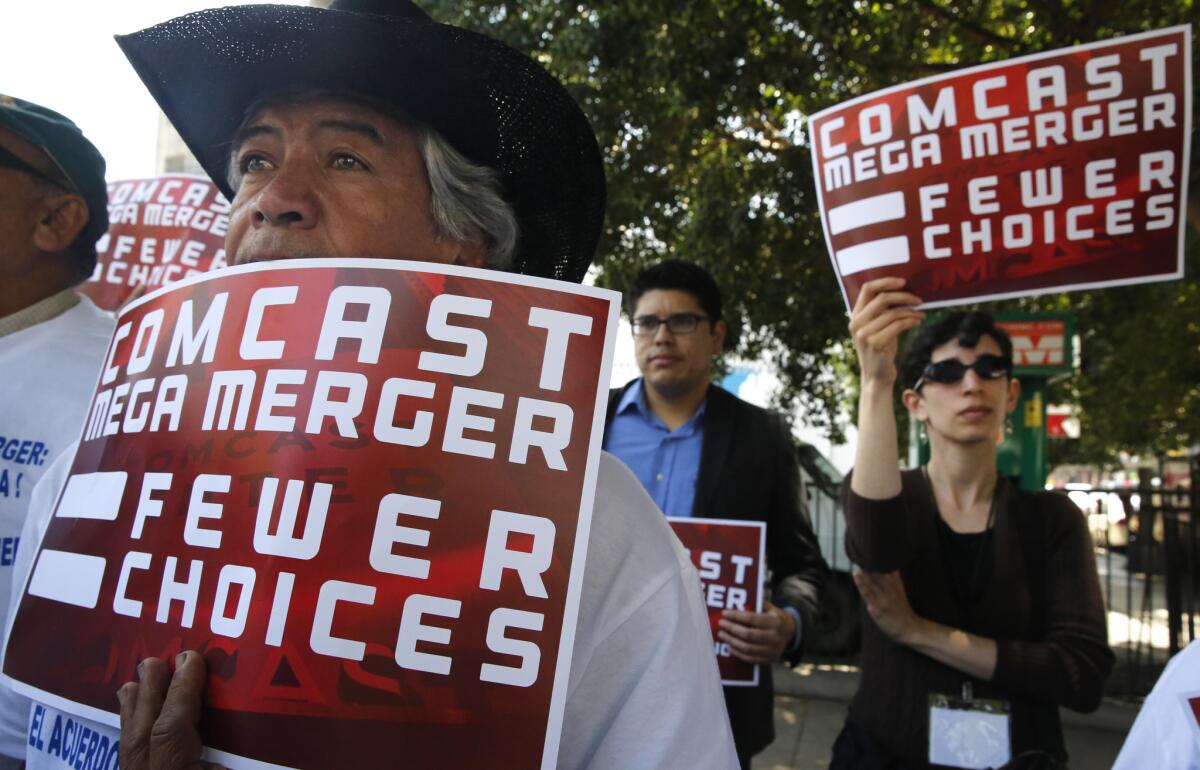Comcast discovers the drawbacks of bad behavior

They got their wish: Comcast dropped its bid for Time Warner Cable last week after it heard discouraging words from the FCC.
Comcast customers and their advocates may believe that the cable company’s reputation for wretched service was the key factor in federal regulators’ distaste for its proposed merger with Time Warner Cable, which has now been called off.
It’s probably true that this was one factor; public forums brim with comments suggesting that dealing with Comcast’s customer representatives can be about as pleasant as dealing with a measles outbreak in your town. The most famous illustration is the epic ordeal with a customer rep recorded by its victim, Bay Area technology journalist Ryan Block. (You can listen to it here, in all its hilariously awful glory.)
But a more important factor may have been Comcast’s relationship with regulators, which may be even worse. Over the years, as we reported when the Time Warner Cable merger was announced, Comcast has compiled an unenviable record of broken commitments to customers and regulators and of corporate deception. The deal finally collapsed last week after the FCC staff recommended that it be subjected to administrative hearings, which at best would have delayed approval for months and at worst would have generated lots of evidence against it.
The question that long hovered over the TWC deal, which would have cemented Comcast into the position of the nation’s largest cable firm by eliminating its No. 2 rival in a $45-billion deal, was whether its history would matter.
The company mustered an army of lobbyists to help push the merger. Its lobbying expenditures were $17 million in 2014, when it was the largest single corporate lobbying client in Washington, and an additional $4.7 million this year, according to the Center for Responsive Politics. Time Warner Cable added an additional $7.8 million last year and $1.7 million so far in 2015. Combined, the companies employed 195 lobbyists, of whom 164 were former government officials.
Against this brute force approach, however, were growing questions about whether the manifestly anticompetitive effects of the merger could be counterbalanced, or even moderated, by regulatory limitations. Staff members and commissioners at the Federal Communications Commission plainly concluded that the answer was no.
There were several components to this conclusion. One was that the merger partners couldn’t make a convincing case that the deal would bring benefits to cable or Internet customers. They tried, notably in a joint appearance by top executives before a Senate committee last April.
Comcast Executive Vice President David Cohen and TWC Chief Financial Officer Arthur T. Minson Jr. asserted that only through this merger would the combined company achieve the scale necessary to “invest the billions of dollars required for next-generation technologies, greater service reliability, secure networks, and faster Internet speeds.” Yet each company already had plenty of free cash. As we observed, the previous year, Comcast had turned a profit of $6.8 billion and TWC nearly $2 billion.
The companies maintained that their merger wouldn’t reduce competition in their markets, because they would divest cable operations in communities where they overlapped. This was a clever bit of misdirection. The real issue was not competition between cable TV operations, but the enormous weight a combined Comcast-TWC would exert over broadband services.
The “unprecedented accumulation of market power” in the high-speed digital world, warned Gene Kimmelman of the advocacy group Public Knowledge at the same hearing, would allow Comcast to “stifle” competition from Netflix, Amazon and other services dependent on the cable firm’s broadband network to reach their own customers.
Comcast had shown itself to be more than willing to exercise that power against even tiny rivals. James Bosworth, CEO of Back9Network, a golf-related cable channel that hoped to compete with Comcast’s Golf Channel, related how he got a complete cold shoulder from Comcast in his efforts to obtain carriage on the Comcast system. He did better with Time Warner Cable--until the merger was announced, at which point his talks with TWC “sputtered.”
Then there was the BitTorrent Affair. In 2007, Comcast was caught degrading traffic from the file-sharing service, which had contracts to distribute licensed content from Hollywood studios and other sources, which could compete directly with Comcast’s pay-TV business.
Comcast flatly denied that it deliberately was blocking or targeting BitTorrent or anyone else. The Electronic Frontier Foundation and Associated Press later demonstrated that this was a lie. The FCC agreed, but barely slapped Comcast on the wrist--ordering the company to cease its ways but not even imposing a fine.
For a while, Comcast behaved, most likely because it needed the FCC’s approval for its merger with NBCUniversal. The huge deal, which closed in 2011, transformed Comcast into a combined content and distribution monstrosity. It should never have been approved, but won a 4-1 vote--including a yes vote from Commissioner Meredith Attwell Baker, who a few months later jumped directly into a job at Comcast. (She’s now the CEO of the wireless telecom industry’s lobbying arm.)
The naifs on the FCC thought that conditions they imposed, including holding Comcast to strict network neutrality rules until January 2018, would rein in the firm’s baser instincts, but whether it has complied with all those limitations has come under question; last week the Wall Street Journal reported that Comcast may have put its finger on the scale against the planned sale of Hulu, the online video service it co-owns with Walt Disney Co. and 21st Century Fox.
Comcast acquired its Hulu interest in the NBCU deal, and the FCC instructed the firm to steer clear of any influence or participation in Hulu corporate decision-making. Instead, it reportedly told its partners that it could help build up Hulu as a major streaming service to compete with Netflix and others, which prompted the partners to cancel the sale. Comcast said in response to the report that it remained a “passive investor” in Hulu and leaves strategic decisions to others.
So a lot of bad karma came together to quash the Comcast-TWC merger: the companies’ failure to make a strong case for the deal, doubts that Comcast could be held to any conditions imposed on its future behavior, and misgivings about its general reliability as a corporate citizen.
If there’s a moral to this story, it’s that a company’s bad deeds eventually catch up with it. But it’s hard to take much comfort in the record; Comcast came very close to winning TWC. It’s still the nation’s biggest cable and broadband operator, and still exercises an unnerving degree of clout over the access that millions of people have to online content.
The level of competition within the broadband space is still meager, which is why Americans tend to have the slowest connection speeds at the highest prices in the developed world. The FCC has struck a blow against further monopolization of Internet access, and its initiative in favor of network neutrality may help to keep the Web free of undue commercial influence. But it still has far to go to bring Americans the best Internet service in the world.
Keep up to date with the Economy Hub. Follow @hiltzikm on Twitter, see our Facebook page, or email mhiltzik@latimes.com.
More to Read
Inside the business of entertainment
The Wide Shot brings you news, analysis and insights on everything from streaming wars to production — and what it all means for the future.
You may occasionally receive promotional content from the Los Angeles Times.











